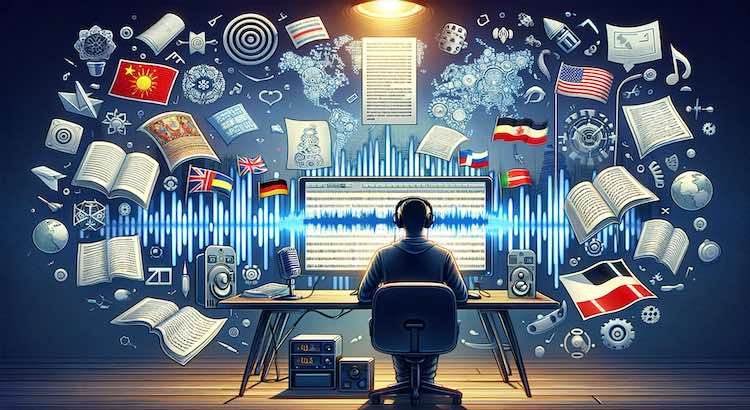Overcoming Challenges in Transcribing and Translating Multilingual Research Interviews
Research in today’s global world often means collecting data from people who speak many different languages. This makes accurate transcription services and reliable translation more important than ever, especially in academic and market research. When research interviews are multilingual, the process gets more complex. This guide explains the main challenges and offers clear solutions so your transcriptions stay accurate and trustworthy.
The Unique Challenges of Multilingual Transcription
Multilingual interviews present hurdles that go beyond basic language skills. Each challenge can affect the quality and reliability of your data.
Linguistic Nuances and Dialects
Languages change and adapt across regions. Regional dialects can mean differences in:
- Pronunciation
- Vocabulary
- Grammar
Transcribers must know these details well. Without experience, it is easy to miss key parts of a speaker’s meaning.
Cultural References and Idioms
Many languages use idioms or cultural phrases that do not translate directly. Misunderstanding these can change the meaning of responses.
- Idioms might not exist in other languages
- Cultural references lose meaning if not explained
Research depends on clear and precise language, making it crucial to capture these elements correctly.
Technical Terminology
Academic and market research often involve specialized terms. Not everyone knows field-specific vocabulary, which can cause problems in both transcription and translation.
- Medical research uses complex terms
- Market research includes industry jargon
Without expertise, these terms may be misheard or mistranslated, leading to inaccurate transcripts.
Proven Solutions for Reliable Multilingual Transcription and Translation
Thankfully, there are clear steps you can take to overcome these challenges and ensure high-quality results.
Use Native Speakers as Transcribers and Translators
- Native speakers understand local dialects and culture
- They recognize subtle language differences
- This leads to more accurate transcripts
A 2022 study found that native transcribers reduced errors in translations by 18% compared to non-native counterparts (2022).
Work With Subject Matter Experts
- Experts know specialized terms in both languages
- They ensure jargon and terminology are accurate
Subject experts help make technical research easier to understand and more reliable.
Leverage Advanced Technology
- Modern automated transcription tools use AI for speed
- AI transcription subscriptions help manage large projects
- These tools handle many languages with growing accuracy
Although technology alone is not perfect, pairing it with human oversight creates the best results. AI-driven solutions are improving rapidly, with error rates dropping each year (2023).
Perform Rigorous Proofreading and Quality Checks
- Use multiple team members to cross-check transcripts
- Apply strict editing standards
- Proofreading catches small mistakes before delivery
Multiple editing rounds ensure your research data remains trustworthy. Services like transcription proofreading offer dedicated checking.
Provide Specialized Training and Support
- Train transcribers on technical subjects
- Offer access to glossaries and expert guidance
When teams can ask questions and review resources, transcription quality rises.
Important Considerations for Multilingual Transcription Projects
When starting your research project, it helps to remember:
- Clarify your needs: What languages do you require?
- Set clear quality standards before work begins
- Plan for time needed for translation, transcription, and review
- Choose a provider that offers fair and transparent transcription pricing
Expanding Access: Captioning and Subtitling for Research
To make research findings accessible, adding captions or subtitles to interview clips is helpful.
- Closed caption services improve access for all audiences
- Subtitling services can reach non-native speakers or those with hearing challenges
- Accurate captions rely on high-quality transcripts
You can learn more about captioning services pricing to plan for your budget.
Translation Options for Research Interviews
Translating research interviews goes beyond word-for-word exchange. Consider both:
- Text translation for written documents
- Audio translation service for spoken content
Choose solutions that fit your format and research needs.
How to Get Started with Transcription and Captioning Services
Uploading your interviews and ordering transcription or captioning is simple:
- Order transcription online for quick service
- Order captions directly for your research videos
Conclusion: Trust GoTranscript for Multilingual Research Interview Solutions
Multilingual research interviews do not have to be a barrier. By using native speakers, leveraging new technology, following careful quality steps, and working with subject experts, you can create accurate and clear transcripts every time.
GoTranscript provides all-in-one solutions for transcription, proofreading, translation, captioning, and more. These services help researchers break down language barriers and ensure data integrity, making it easier to share ideas and findings with a global audience.
Get started with GoTranscript to make language an advantage in your research.


 Transcription
Transcription
 Captions (FCC/SDH)
Captions (FCC/SDH)
 Transcript Editing & Proofreading
Transcript Editing & Proofreading
 Translation (text/audio/images)
Translation (text/audio/images)
 Subtitles
Subtitles
 Video Description (AD)
Video Description (AD)









